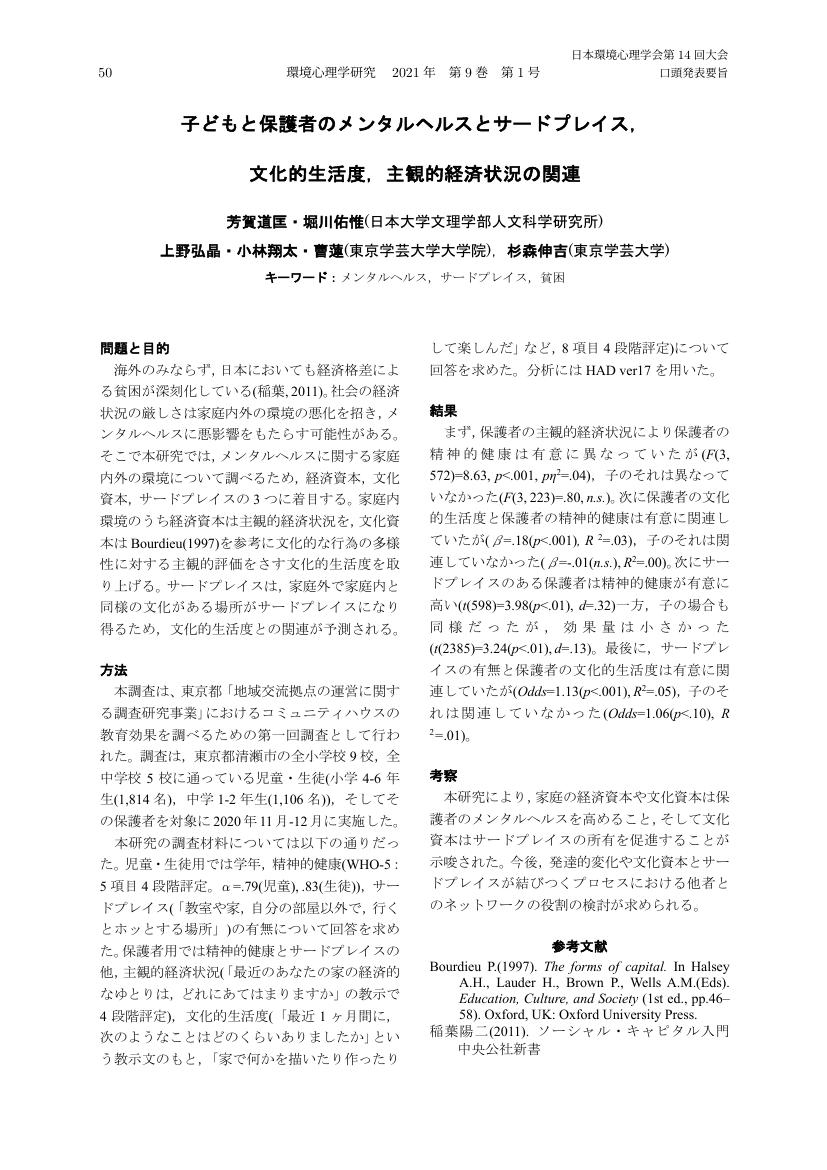2 0 0 0 OA 大学生活におけるソーシャル・キャピタルと主観的ウェルビーイングの関連
- 著者
- 芳賀 道匡 高野 慶輔 羽生 和紀 西河 正行 坂本 真士
- 出版者
- 公益社団法人 日本心理学会
- 雑誌
- 心理学研究 (ISSN:00215236)
- 巻号頁・発行日
- pp.87.15010, (Released:2016-05-10)
- 参考文献数
- 43
- 被引用文献数
- 1 7
The purpose of this study was to examine how university social capital and subjective social capital could predict undergraduate students’ subjective well-being including depression, school satisfaction, and life satisfaction. In this cross-sectional study, we conducted multilevel structural equation modeling on the data of 2,021 students at 38 universities in Japan. At the university level, we found the associations between social capital (fellows) and depression, social capital (classmates) and life satisfaction, and social capital (faculty) and school satisfaction. At the student level, all subjective social capital (fellows, classmates, and faculty) were associated with all the factors of subjective well-being. These results suggest the influence of university social capital and that of subjective social capital are associated with students’ subjective well-being.
- 著者
- 芳賀 道匡 高野 慶輔 坂本 真士
- 出版者
- 公益財団法人 パブリックヘルスリサーチセンター
- 雑誌
- ストレス科学研究 (ISSN:13419986)
- 巻号頁・発行日
- vol.30, pp.102-110, 2015 (Released:2016-01-15)
- 参考文献数
- 30
- 被引用文献数
- 2 2
Interpersonal relationships are one of the most important factors that make students resilient to stressors. In the present study, we focused on social capital as an amount of available resources derived from human relationships. We examined two aspects of social capital, namely network size and subjective social capital, to determine which of the aspects is more predictive of depressive symptoms and subjective well-being. We collected data from 1,772 undergraduate students across 38 universities. Correlational analysis showed that network size was significantly associated with depressive symptoms and subjective well-being. However, the results of hierarchical multiple regression analysis indicated that subjective social capital significantly predicted depressive symptoms and subjective well-being even after controlling for network size. These findings suggest that subjective social capital in university life is an important factor for student’s psychological adjustment and well-being.
- 著者
- 芳賀 道匡 坂本 真士
- 出版者
- 公益財団法人 パブリックヘルスリサーチセンター
- 雑誌
- ストレス科学研究 (ISSN:13419986)
- 巻号頁・発行日
- pp.2022001, (Released:2023-05-17)
- 参考文献数
- 17
The purposes of the present study were to report a loneliness reduction model using student’s subjective social capital (SSC), computer mediated communication (CMC) or face to face (FTF) behavior and perceptions of the closed spaces, crowded places, close-contacts avoidance (perceptions of the norms of avoiding 3Cs) in COVID-19 pandemic. In this article, we focused on subjective social capital as people’s cognition of the psychosocial resource availability accumulated by contact with others. Online cross-section research was conducted at 3th faculties in a Japanese private university, in July 2020, collecting 732 samples. And analyses were done for 659 samples. The results showed that the norms of avoiding 3Cs affected computer mediated or face to face communication behavior, and computer mediated or face to face communication behavior affected SSC, and the SSC reduces loneliness. These results imply that SSC, CMC and FTF are the important factor for student to decrease loneliness in COVID-19 pandemic.
1 0 0 0 OA 大学生活における主観的ソーシャル・キャピタル尺度の開発
- 著者
- 芳賀 道匡 高野 慶輔 羽生 和紀 坂本 真士
- 出版者
- 一般社団法人 日本教育心理学会
- 雑誌
- 教育心理学研究 (ISSN:00215015)
- 巻号頁・発行日
- vol.65, no.1, pp.77-90, 2017 (Released:2017-04-21)
- 参考文献数
- 31
- 被引用文献数
- 5 6
本研究の目的は, 2つの研究を通して, 33項目から構成される大学生活における主観的ソーシャル・キャピタル尺度(SSCS-U)の開発と, 信頼性および妥当性を検討することにあった。本研究では2つの調査を通じて, SSCS-Uを構成する項目を選定し, 開発されたSSCS-Uの因子構造の再現可能性, 内的一貫性と再検査信頼性の検討, そして他の心理社会的要因との関連を検討した。その結果, SSCS-Uは, 仲間, クラス, 教員に関する主観的ソーシャル・キャピタルという3因子によって構成され, 因子構造の再現可能性があることが示された。また, 内的一貫性と再検査信頼性があること, ソーシャル・スキルおよび主観的ウェルビーイング, ソーシャル・キャピタル関連行動と関連があることが分かった。本尺度は, 学生が主観的に認知しているソーシャル・キャピタルを包括的に測定する尺度として, 大学生活のソーシャル・キャピタルに関する研究の更なる発展に寄与すると考えられる。
1 0 0 0 OA 子どもと保護者のメンタルヘルスとサードプレイス,文化的生活度,主観的経済状況の関連
- 著者
- 芳賀 道匡 高野 慶輔 羽生 和紀 西河 正行 坂本 真士
- 出版者
- 公益社団法人 日本心理学会
- 雑誌
- 心理学研究 (ISSN:00215236)
- 巻号頁・発行日
- pp.273-283, 2016
- 被引用文献数
- 7
The purpose of this study was to examine how university social capital and subjective social capital could predict undergraduate students' subjective well-being including depression, school satisfaction, and life satisfaction. In this cross-sectional study, we conducted multilevel structural equation modeling on the data of 2,021 students at 38 universities in Japan. At the university level, we found the associations between social capital (fellows) and depression, social capital (classmates) and life satisfaction, and social capital (faculty) and school satisfaction. At the student level, all subjective social capital (fellows, classmates, and faculty) were associated with all the factors of subjective well-being. These results suggest the influence of university social capital and that of subjective social capital are associated with students' subjective well-being.
